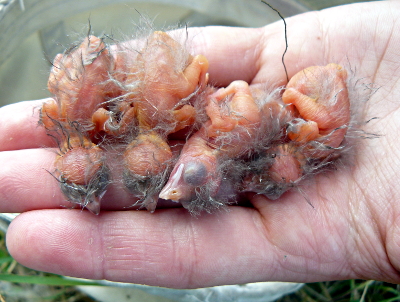In cooperatively breeding species some individuals forgo reproduction and help others to produce offspring. This form of cooperation entails benefits and costs for the parties involved, with the potential for conflicts over parental care to arise among members of cooperative groups. We are interested in studying cooperation and conflict over parental care in birds that are hosts of heterospecific brood parasites. Brood parasitism is likely to affect the fitness pay-offs of breeders and helpers because parasitic chicks are unrelated to both and are costly to rear.
Researchers and students involved in this area: J. C. Reboreda, Ma. C. de Mársico, M. Mermoz, C. Ursino, J. M. Rojas Ripari and MN. Sabio.
by Ma. C. de Mársico
Cooperative breeding in birds is a reproductive system in which one or more adults (helpers) assist other in rearing their offspring. To explain the evolution and maintenance of these systems continues to be challenging given the great diversity in social organization and mating systems found among cooperatively breeding species.
In our lab, we study the social system of the grayish baywing with the aim of contributing to expand the knowledge about cooperative breeding in temperate Neotropics. Combining field experiments and observations with genetic analysis and other tools, we address the following aspects of cooperative breeding:
- - social organization and individual contribution to parental care within cooperative groups
- - possible benefits of helping to breeders and helpers
- - investment strategies of breeders and helpers and negotiations over parental care
- - cues and mechanisms involved in individual recognition
- - sexual dispersal patterns and fine-scale spatial genetic structure
In addition, we are interested in exploring potential interactions between cooperative breeding and brood parasitism. Baywings are primary hosts of the brood-parasitic screaming cowbird. Therefore, they give us an excellent opportunity to investigate if the presence of helpers at the nest can mitigate the reproductive costs of parasitism and/or enhance the success of brood-parasitic offspring.

Baywing's nest with six chicks. Photo: R. Moller Jensen.
Fieldwork
Our field work is being carried out at Reserva El Destino - Elsa Shaw de Pearson Foundation, located in the Province of Buenos Aires, Argentina. From November to March, the Baywing reproduce in this place, allowing us to perform field experiments and to work with individuals in captivity.
Related publications
Ursino CA, De Mársico MC, Sued M, Farall A and Reboreda JC. Brood parasitism disproportionally increases nest provisioning and helper recruitment in a cooperatively breeding bird. Behavioral Ecology & Sociobiology 65: 2279-2286 (2011).




